A few weeks back, we covered this 1964 Seagraves fire truck. It was one of those, “What am I going to do with this?” sort of a post. Specialized vehicles always present that kind of a conundrum but today’s find, a 1970 Ford F-250 Highboy “Brush Truck” may prove to be a bit more functional. This F-250 is located in Middle River, Maryland and is available, here on eBay for a current bid of $18,300 with 30 bids tendered so far.
So what exactly is a brush truck? Well, I’m no fire department expert but I would imagine, based on this truck’s 4X4 drivetrain, highboy status, winch, and hoses/pumps, it would be used for putting out brush fires in hard to access places. This undocumented 15K mile example, like most medium-capacity trucks from a half-century ago, is attractive in an uncluttered way with a focus on functionality. Besides its obvious condition, Ford stylists nailed the design of this basic box on wheels. Of course, a truck back in ’70 was truly a utility vehicle, not an everyday/everyway driver as pickup trucks have become today. The only Marine City that I could find is in Michigan but based on this truck’s low mileage and excellent physical condition, it would seem that brush fires aren’t an everyday event there.
The surprise for me is under the hood as this F250 is motivated by a 215 HP, 360 CI “FE” V8 engine. Why a surprise? I didn’t know such a powerplant existed. It was apparently a truck-only engine offered from 1968 through 1976. The seller makes no mention of this truck’s operating prowess, but with only 15K miles and knowing how meticulous fire departments are with their equipment, it’s hard to imagine that this Ford has a running or driving problem. The powertrain also includes a four-speed manual transmission with a manually engaged transfer case for 4X4 opereation.
As to the specific fire equipment, the seller adds, “Everything works, all lights, siren, and spotlights“. Hmmm, could be a lot of fun but also a way to get into some big trouble. Probably best used as a display or parade vehicle, you could also use this brush truck for the original purpose intended if you were a land baron out west.
The interior is very purposeful in nature, about what one would expect. Unfortunately, it has the interior “clutter syndrome” that so many vehicles for sale seem to possess, you know, let’s see how much stuff we can stick in there and then, take the picture. It’s equipped in a fashion as emergency vehicles frequently are with a radio, spotlights, extra switchgear, and an extra auxiliary gauge of some sort. I must admit some confusion to the low mileage claim and the split driver’s seat, a misplaced ax perhaps?
Having a basic idea of what specialized fire equipment costs, I’m surprised that this truck is now retired but I guess age matters and that may be the issue, age, technology, and a concern for reliability. There’s a lot more here to work with than there was with the Seagrave fire truck so that being the case, what are your suggestions for how to best use this Ford F250 brush truck?
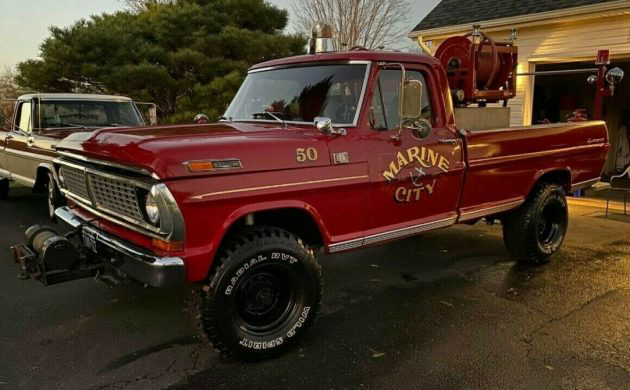
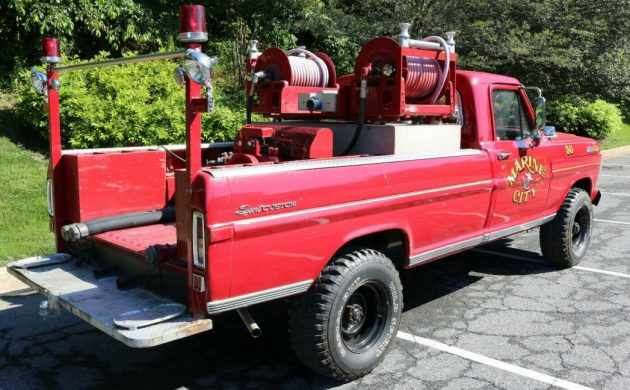
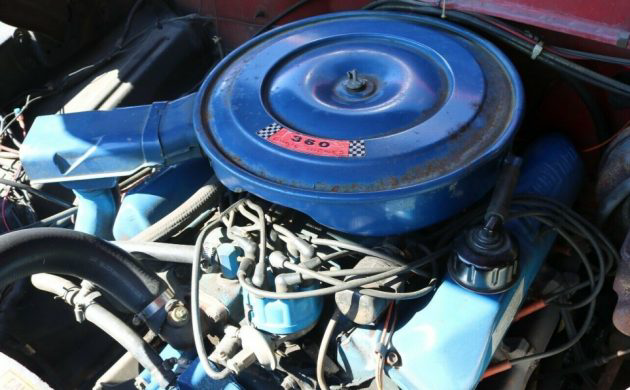
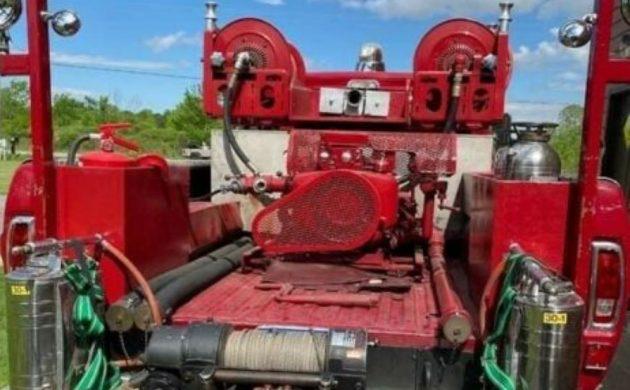
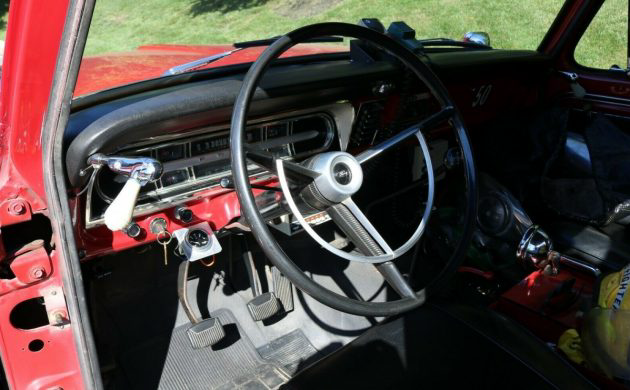
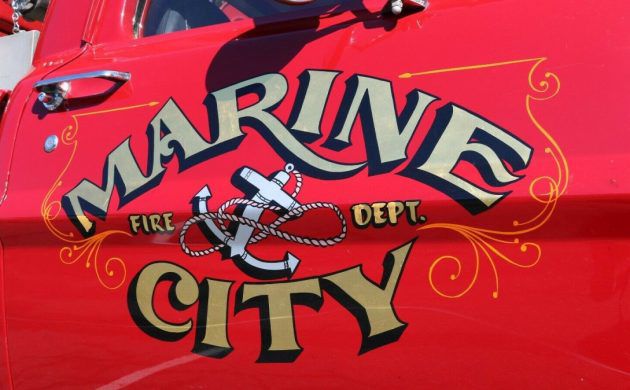



Wow, a mileage claim that appears to be accurate! You don’t see that very often! I am pretty sure that the engine has seen a fair amount of idle time though. Nonetheless, a nice low mileage Ford F250 brush truck.
It looks to me like the logos on the doors were painted fairly
recently,& a made up department name.Most departments remove
theirs when they sell a rig to a private party.
And the lettering is basic bold font. This is somebody’s artwork.
Not made up
https://www.facebook.com/602330646586262/photos/a.602332133252780/602333419919318/?type=1&theater
Not made up
https://www.firetrucks.com/new-deliveries/23346>https://www.firetrucks.com/new-deliveries/23346
Ok,I was wrong about that,but I’m still surprised
that they wouldn’t remove their logo from the doors.
A.G. , Well done !!
Hi Jim, yes, that is correct about the 360. It is pretty identical to the 390, which was also available during that time period. It succeeded the aging 352 which the trucks used from 1965 to 67.
352 factory blocks were used in the 360 & 390 builds. I find a moroso open air cleaner and dual exhaust kick this engine up a notch , going to 4v carb would be useless as these trucks got 10 mpg with a 2v & fully tuned up.
Jim, you are correct in that brush trucks are used by rural departments with lots of open space and fields to protect. This little rig with its manual 4-speed with stump-puller 1st and 4-wheel drive would have been perfect for chasing a fast moving brush fire. The unit in the bed is a drop-in “skid unit” consisting of a small water tank, pump & drive motor and twin 1″ hose reels. The rear shot shows two lengths of hard suction used to refill the tank or supply the pump directly from a convenient pond. Also shown are two 5-gallon Indian Tanks, worn on your back and used for small spot fires.
A seldom known or talked about identification feature is that there were two (maybe more)? 360 V/8 blocks. If one is looking for a great, solid rebuildable core in a yard, and only 360 blocks are available to choose from, search for the block which has the external heavier webs cast into the sides below the heads. These are blocks which were shared with the 390 and can be easily built up into a 428 without danger of overboring into coolant jacket territory, thus creating an overheating issue or strength loss in the casting The heavier, thicker extrusions are easily seen, especially in a side by side comparison
Nice write-up, Jim. I am familiar with the 360 truck engine because I almost bought a ’70 1/2 ton, short bed styleside from a friend of mine in high school. 3 on the tree and manual everything, but it had the 360, huge tires, headers and Cherry Bombs so I was in love! I came so close to making the deal, then quickly remembered all of the times I saw him jump on that throttle and peel out, beating the heck out of that poor truck in the process. I changed my mind and bought a spotless ’63 Chevy 1/2 ton with a 283 from a nice old man, and never regretted that move.
I’m a Ford guy, Blue Oval all the way, this is a cool truck, but my question is the engine. I have no experience with the 360, but it has been my understanding that they were about as bad as the 352. The 390 was a great motor, but can someone let me know about the 360? It wasn’t built that long and seems short on the hp.
Hi Vance, the 360 was rated low in horsepower because, as Ford would claim, for a better torque curve. The same went for the 352 (208 hp) in trucks. Chevy and Dodge rated their truck engines lower than cars as well. The 360 was used from 1968 to 76.
10 mpg, wherever you went.
I had a ’76 F-250 4×4 that I bought new in 1976. It had the 360, and 4 speed manual. Sold it in 1994 to get an F-350. Only problem I ever had was a vacuum leak from a split hose. Had ample power, and without lockout hubs it got 8 mpg.
BTW, the front seat seams split readily, no need for a misplaced axe!
I had a ’68 F250 Camper special with a 360.
It was a really doggy engine.
Last former brush truck on here was June 15. It was a 1976 F250 out of Rimersburg, Pennsylvania.
I had a 71 with a 360, and was around a few other Ford’s with the 360,not a bad engine but kinda doggy and it seemed like every one of them had an exhaust manifold leak.
They did have a great granny gear though
4 low and first gear, once you let out the clutch you could just walk next to it at around 4-5 mph
Vintage fire dept. pickups always draw attention, just because a cleaner example can’t be found. While this might be considered a brush truck, I think it’s more of a transfer unit, as the tank is too small. It may have pulled a tank and while they have low road miles, the motors have a ton of “engine hours”. If you want to “save the farm”, I’d think a regular, unwanted pumper engine for a fraction of the price, would be better. The seller is clearly trying to appeal to vintage Ford pickup buyers, and more than likely, it will be stripped of it’s equipment. It’s worth a lot more as a clean, low mileage regular pickup than a fire engine. I bet there’s still a bunch of these in a corner of every firehouse in the country you pass by.
As I have recently found out, modern 500 gallon firetrucks are retired for a reason (Pumpers are useless as brush trucks). As I was told by Cal-Fire “we sell them because they have a problem that is too much trouble or expensive to fix.” You are buying that problem, and chasing it down can cost a LOT. Parts for a firetruck are eye watering, often 10x the cost of a similar part, and finding a specialty shop to access the very hard to reach plumbing and associated mechanicals is difficult and costs start in the thousands. There are a lot of systems and valves, air, hydraulic, water, electronics, all take a beating. Plus they carry a lot of weight and have many miles on the chassis and engine.
So this truck that can bring 200 gallons to a spot fire that can be easily worked on is a pretty good value. It can reach out 100′ from each side and with auto winding reels, be pretty easy to retract and move. 200 gallons won’t last long, but with a good draft source nearby, it should be a 5 minute operation to refill. I think this one will actually be put back to work on a western property.
Fire engine work must be done by certified shops for any kind of insurance coverage. “Hank’s General Store and Any Car Service Garage” won’t cut it. Putting life and property on the line for aged-out equipment is bad news. Find some other use for the vehicle, please!
That’s true for Engines and Ladders that are certified have firefighting apparatus by ISO but is not true for trucks like this. Many fire departments that have units like this work on them themselves or have a local shop work on them since they are nothing but a basic pickup truck. Working on them this way saves the department money as well as keeping it in great condition. That’s not an issue at all as far as certifications for the unit go.
I live 15 minutes from this Vee Hikkle if anyone needs a good inspection of it.
I never understood the 360 FE. You basically lose the torque of a 390, and still get the same crappy mileage. My brother had a 1971 F250 with one, and when it got a little worn, he stroked it to a 390.
Departments get rid of perfectly serviceable engines for a number of reasons, age counts and some insurance companies will not cover the engine, and more importantly, not provide liability coverage if, for example, the engine’s brakes fail (this would have ordinary hydraulic brakes) on route to a fire, the age varies, but 25 years and 30 years appear to be the norm. An older engine can be sometimes be classified as a “parade vehicle” or “reserve” and covered, with strict limitations on mileage, hours, and use.
And, no, the department that is getting rid of the vehicle often does not take off the decals. They are hard to remove, and the day the new vehicle comes in the old one is stripped of the gear that will go on the new one, and gotten rid of fast.
Just like the car dealers did with my “trade-ins” on at least two occasions, I saw them driving them off the lot before I drove off in the new one.
Parts for the pumps are sometimes unobtainium, there would be parts for what Ford built, but not the equipment.
There are not many places that work on pumps – it is a very specialized trade – there appear to be only two in California, which, last fall due to the heavy use of equipment in all the fires, had a 6 month waiting period to get one’s engine fixed. And, they command very high prices
.
It’s a 1970 truck. The 352, 360 and 390 all used the same block, along with several others. All had 352 cast on the left front side. 352s and 360s have 3.5” stroke and 390s have 3.780”.
My guess is that the existence of both 360 and 390 engines was solely so ford could offer the smaller 360 as std equipment and then add an upcharge for the larger 390, yet cost wise the 390 should have been around the same cost to build since the difference between the two is basically stroke. 2 engines for the price of one. 360 and 390s are very reliable and generally long life engines but certainly not known for high output from the factory.
My main criticism of the Ford FE engine series was they commonly had oil leaks and seepage near the valve covers and where the intake manifold meets the cylinder heads. I’ve joked with people that the 360 and 390s were externally oiled since I’ve seem so many over the years just caked with grime from leaks. Very durable though and extremely common from the late 60s till mid 70s.
I personally think that the 390 was a better engine than the 400M that replaced it in 1977. In 76 you could get a 390 or 460 in f series pickups if you wanted a larger v8. For 77 the 390 was gone replace by your choice of 351M, 400M, or the 460 (385 series) V8.
Great info, guys. Thanks!
Nice car. Love it! 1970 Ford F250 Truck shop manual here https://fordmanualblog.wordpress.com/2019/04/28/1970-ford-truck-shop-manual-pdf-download/